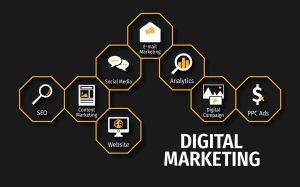Google has Gemini. Microsoft has Copilot. Both companies are using their flagship generative AI tools to enhance online searches. There are also organizations like Perplexity, organizations looking to redefine how we use the internet in hopes of getting rid of the legacy internet search altogether. What if all these strategies, working together, actually bring an end to what we know as the ‘Google search’? What will that mean to digital marketing?
What is now considered legacy search has been around since the earliest days of the public internet. It started with search engines like Alta Vista and Lycos. Even Yahoo! was one of the early pioneers of keyword-based search. But we have come a long way since then.
As experts in digital marketing in Utah, Webtek has been part of the search evolution for many years now. We have seen tons of updates to Google algorithms. We have seen old search engines fade away and new replacements emerge. And now we are staring generative AI in the face. It seems inevitable that generative AI will ultimately replace legacy internet searches.
How Searching Will Change
When generative AI eventually becomes the norm for internet search, digital marketing will most certainly have to adapt. Agencies like ours will have to change how we market in order to accommodate how people search for information online. And how will they do that? Here are just a few things we see coming down the pike:
1. Asking Complex Questions
The legacy search paradigm is highly conducive to searching for information using a few keywords. If you are looking for a digital marketing agency in the Salt Lake City region, you might type ‘digital marketing Utah’ into Google’s search bar. Speaking a similar phrase to your smartphone would be the equivalent in a mobile search scenario.
With generative AI, everything changes. Instead of searching with one or two keywords, you are likely to ask questions. Moreover, you will be able to make your questions as complex as you like. You could ask your favorite search engine something like, “What are some of the best digital marketing firms in Utah? And if I have a limited budget, is it better to concentrate on digital marketing or SEO?”
Generative AI can sort out the multiple components of your question and find information to answer each one. Not only that, but AI could also understand that you might have budgetary concerns, thereby pointing you to digital marketing or SEO providers known to offer more affordable services.
2. Highly Personalized Search
It is inevitable that AI-based searches will be highly personalized. Products like Gemini and Copilot are already designed for that purpose. For example, using Copilot inside of the Windows OS ecosystem allows the tool to gather and analyze information based on everything you do within Windows, then use that information in conjunction with search queries to give you personalized results.
Copilot inside the Microsoft 365 environment does the exact same thing but at a higher level still. It can access information from within a Microsoft 365 tenant that is exclusive to each individual user. Two users could launch the exact same inquiry and get separate answers because their activity within the Microsoft 365 environment is different.
3. Answers Instead of Links
Perhaps the most profound change we expect to see from AI-based search is how search engines return results. Perplexity is already doing this. Rather than responding to queries with links, the search tool compiles information from multiple sites to present a comprehensive answer. Reference links may appear below the answer, just in case the user wants to follow up, but the answer itself provides most of the requested information.
This works outside of the Perplexity tool. It works extremely well in both Gemini and Copilot. And guess what? The principal goes well beyond searching for information on general topics – like the smoky mountains, for example. You can actually ask Gemini to find you the best price on a particular product and it will. Its answer will include two or three choices for you to look at.
4. A Conversational Model
Wrapping everything up with a nice ribbon and bow is an entirely new search paradigm that emphasizes conversations rather than requests for links. Users will converse with search engines, whether through text or speaking, in a continual back and forth until the user’s curiosity is completely satisfied. Instead of running search queries, we will be conversing with search engines the same way we converse with coworkers and friends.
The Implications for Digital Marketing
All of this begs the question of what the future holds for digital marketing. First, digital marketing is not going away. In fact, the need for effective digital marketing strategies will be even more pronounced as we make the shift from legacy search to AI-driven search. The search landscape will become more competitive simply because companies will not be able to depend so heavily on SEO to drive traffic to websites.
In the future, digital marketing is going to be less about search and more about content placement. It is going to be less about getting traffic to your website and more about placing content on sites you know your customers are likely to visit.
Most importantly, generative AI’s ability to facilitate a deeper understanding of just about any topic will require a higher emphasis on content quality. Marketers will no longer be able to rely on generalized content that only scratches the surface. Content will have to be detailed and presented from an expert point of view to be considered relevant by AI tools. That means content will be more costly to produce.
Only a Matter of Time
The way things are currently headed, it seems as though it is only a matter of time before AI-based search replaces legacy search. Simple searches like ‘digital marketing Utah’ will give way to complex questions and answers as users converse with their search tools. It is coming. The question is whether digital marketers will be able to successfully adapt.















